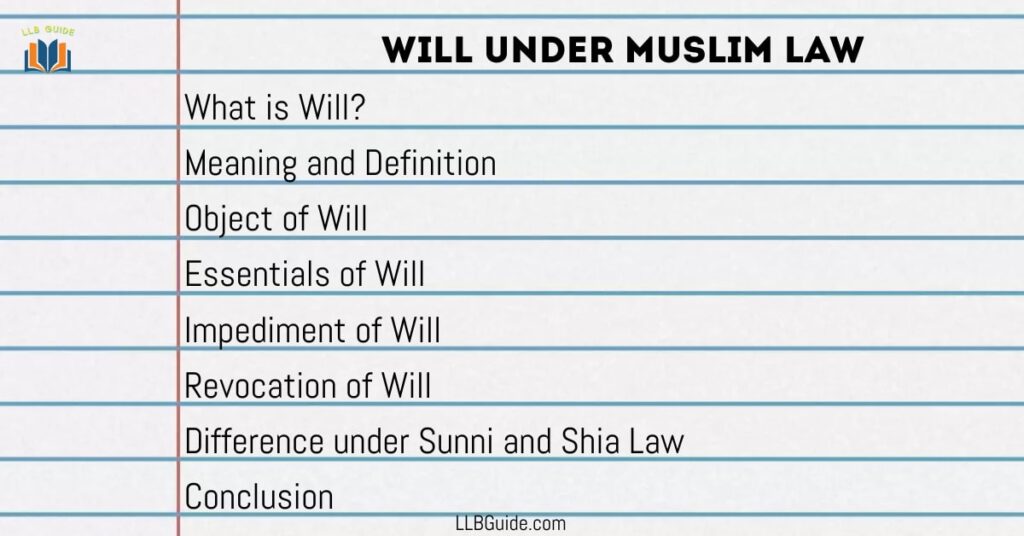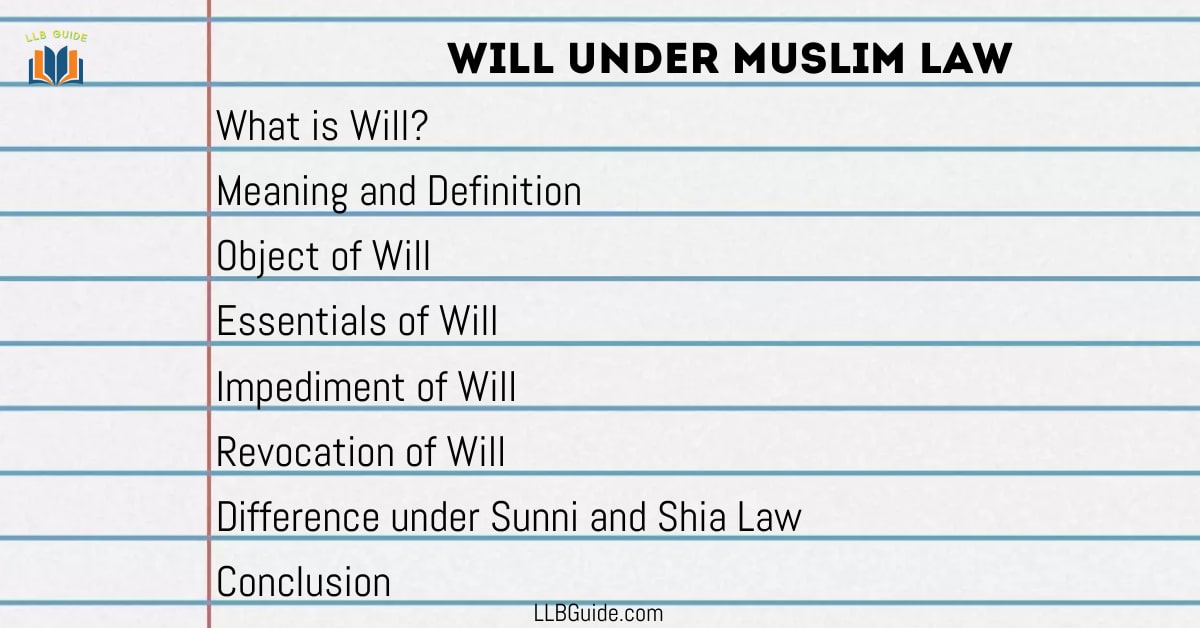Will under Muslim law refers to a document which states the desire of such a person who makes it (legator), about what is to be done with his property after his death. Will is a way to dispose of property like Gift and Waqf. One can not make a will of more than one-third share of his property. It can be revoked anytime during the lifetime of the legator by the legator. Acceptance of will by the legatee is a must. It only becomes effective after the death of the legator.

Table of Contents
What is Will Under Muslim Law?
The whole concept of Will under Muslim law pdf is explained below:
What is Will?
Will under Muslim law is such act or process by which one person desires and ensures how his property (movable or immovable) will be disposed of after his death. Unlike gift or waqf, one may make a will of only one-third share of his property. He may modify or cancel the will, at any time before his death. Will is only applicable after the death of a person who makes it. It may be verbal or written.

The will property may be transferred after the following:
- After paying the funeral or burial expenses of the testator.
- Paying his debts e.g. dower.
Meaning of Will
Will means a fixed and persistent intent or purpose. It is a legal document declaring a person’s wishes regarding the disposal of their property when they die.
Definition of Will
According to the Succession Act 1925:
Will is the legal declaration of intention of the testator concerning his property which he desires to be carried out after his death.
Object of Will
The object of the will is to provide for the maintenance of members of the family or other relatives where they cannot be properly provided for by the law of inheritance. Will can not be made to prevent any legal heir from his right.
According to the Shariah:
‘One is entitled to make a will for one-third of one’s property and not beyond that so that the rights of the legal heirs are not adversely affected’.
Essentials of Will
The following are the essentials of valid will under Muslim law:
1. Competency of Legator
The legator is a person who makes the will, he must be:
- Muslim (male or female)
- Adult
- Sound Mind
- Owner of property
2. Competency of Legatee
The legatee is a person to whom the will is made, he should:
- Alive (will in favour of dead person is void)
- Muslim or non-Muslim
- Major or Minor
- Sound or unsound mind
- Unborn child (Unborn child means child in the womb of his/her mother.
- Capable of holding property
3. Subject of Bequest
The subject matter of the will must be:
- lawful
- movable or immovable
- in existence (at the time of will and at the time of death of the legator)
4. Acceptance by Legatee
Acceptance of will by legatee (to whom will is made), is a must.
Impediment of Will
Impediment refers to the bar to will in Islamic law, no man can benefit from his wrong. For example, if the legatee kills the legator, the will may be revoked.
Contingent Will
The word contingent refers to conditional. Contingent will is allowed but the condition must not be immoral. For example, one person sets a condition for his son that if he gets married to his brother’s daughter he will make a will in his favour.
Revocation of Will
Will under Muslim law is revocable. Will is effective only after the death of the legator, the legator may revoke the will at any time in his life after making it. The revocation of will under Muslim law may be expressly or impliedly.
1. Will can be revoked by a formal expression of legator.
2. If the legator makes changes in the subject matter of will, like makes a will of a plot but later on builds a house on it, such will be revoked automatically.
3. In case the legator makes the gift of the same property to any other person, the will shall be revoked.
4. Will is also revocable by subsequent Will.
Difference between Sunni and Shia Law
While understanding the meaning of will, there is a difference of opinion between Sunni law and Shia law. Such difference is mentioned below:
1. As to acceptance
In Sunni law, acceptance may be made after the death of the legator.
In Shia law acceptance may be made before or after the death of the legator.
2. As to the death of the legatee before the legator
In Sunni law will may be revoked.
In Shia law will may be revoked (if there are no legal heirs of the legatee) or valid (if there exists the heirs of the legatee).
3. As to Unborn child
According to Sunni law unborn child means a child who will born in the next 6 months.
According to Shia law unborn child means a child who will born in the next 10 months.
4. As to the opinion of legal heirs
In Sunni law for a will in favour of any legal heir, the consent of other legal heirs is necessary.
In Shia law, no one’s consent is required.
5. As to the Murder of Legator
In Sunni law even intentional or accidental murder there will be no will.
In Shia law if intentional murder then no will, accidentally then the legatee will get will.
6. As to the Suicide of Legator
In Sunni law will is valid.
In Shia law will is invalid (invalid if the will is made at the time of suicide and valid if made some time before).
Conclusion
Will under Muslim law refers to a document which states the desire of such a person who makes it (legator), about what is to be done with his property after his death. It can be revoked during his lifetime.
FAQs
What is the relevant provision of law to will in Pakistan?
Succession Act 1925 sections 59 to 179 are related to will in Pakistan.
What is the full meaning of will?
Will means a fixed and persistent intent or purpose. It is a legal document declaring a person’s wishes regarding the disposal of their property when they die.
What is will in Islamic law?
Under Islamic law: ‘One is entitled to make a will for one-third of one’s property and not beyond that so that the rights of the legal heirs are not adversely affected’.
What is the difference between a will and a gift?
In Gift full property can be gifted but in will only one-third.
Who can make a will under Muslim law?
Any Muslim (male or female) who is adult, sound mind and owner of the property.

